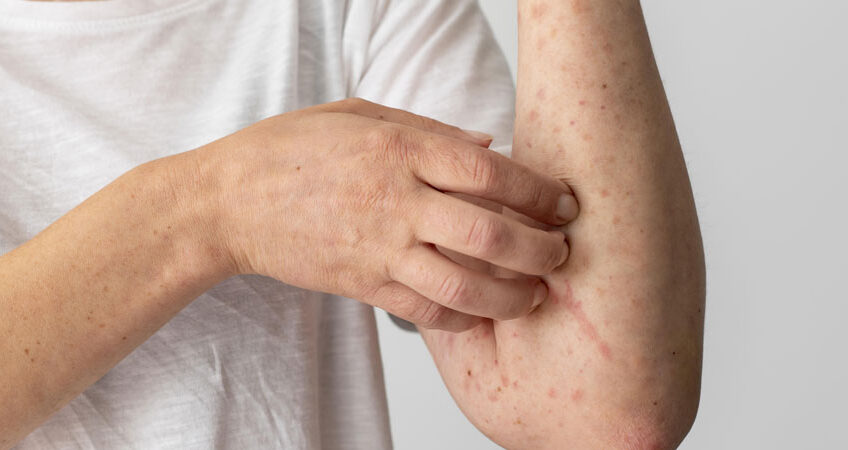Everyone cares about their skin and wishes for glowing and healthy skin. Skin diseases such as Psoriasis hinder the quality of life, add stress and reduce the social activity of the individuals.
Detecting skin infections at an early stage avoids severe complications in the long term. In this case, consulting an Ayurvedic doctor for Psoriasis is the right decision.
What is Psoriasis?
Psoriasis is a long-lasting and widespread disease that is a systemic inflammatory, chronic or genetic disease. The infection developed areas of the skin turn thick with redness and itchy plagues accompanied by thick silvery scales.
Psoriasis’s common places include nails, scalp, elbows, legs and knees. Psoriasis stays restricted in small areas or may spread across the skin. As the infection underneath gets to the top of the skin, it kills the healthy cells. The above is the significant reason that causes itchy and red plaque over the skin that has white scales.
General types of Psoriasis:
The long-lasting condition called Psoriasis falls into various categories as follows.
1. Plaque psoriasis
The chronic auto-immune condition called plaque psoriasis arouses thick patches of scaly, red skin. The condition is caused as the skin cells develop more skin cells instantly, leading to scaling and patch growth.
2. Guttate Psoriasis
Legs, arms, and trunks are the main area for guttate psoriasis growth as salmon, small pink bumps over the skin. Guttate Psoriasis is not a contagious type but happens due to an inherited genetic predisposition. The condition starts with a streptococcal sore throat accompanied by a skin infection.
3. Inverse psoriasis
The most arduous and painful Psoriasis usually arises in the armpits, skin folds of the body, under buttocks, breasts, and genitals. It is a genetic condition known as flexural Psoriasis and is passed down through families. Obese and over-weight people with deep skin folds are prone to inverse psoriasis.
4. Pustular Psoriasis
Pustular Psoriasis is identified on the skin as elevated bumps filled with pus. This pus is a thick white fluid of white blood cells, and the area around the pus turns red.
5. Erythrodermic Psoriasis
Erythrodermic is an inflammatory form of Psoriasis, a severe variant of Psoriasis Vulgaris. The serious and rare erythrodermic Psoriasis arouses in people possessing unstable plaque psoriasis. The above Psoriasis exfoliates the skin, spreads, and causes fiery redness. The affected individual experiences severe pain and itching.
6. Scalp psoriasis
From the head and reaching the top of the forehead, scalp psoriasis also affects the rear part of the neck and ears. The scalp psoriasis occurs as silvery scales and red patches with itching.
7. Palmoplantar psoriasis
Palmoplantar Psoriasis affects the soles of feet plus hand palms and is considered a recurring condition. The condition is hereditary at times and mainly affects adults. Palmoplantar Psoriasis affects daily life as its severity results in deep yellow pustules.
8. Nail psoriasis
The color, thickness, and shape changes in fingernails and toenails are the primary symptom of nail psoriasis. The nails turn yellow, green, or brown with white spots underneath. Development of grooves and ridges with chalky white accumulation happens in nail psoriasis.
What are the Symptoms of Psoriasis?
The significant symptoms of Psoriasis include scaly skin that has red, white patches all across the body and genital areas. At times the skin is rough, cracking, flaky, and bleeds. Certain psoriasis experience pus-filled blisters, itchy skin, and yellowish-orange toenails.
What are the Main Causes of Psoriasis?
The leading cause of Psoriasis is still unidentified. Few researchers conclude it is associated with the immune system and others conclude it is due to genetic influence. Though the leading cause is an unknown, a few causes include
- Smoking
- Stress
- Lack of vitamin D
- Stress
- Bug bites, sunburn, skin injury, scrape or cut
- Heavy alcohol consumption
How do Travancore Ayurveda Doctors Treat Psoriasis:
Travancore Ayurveda doctors distinctively treat Psoriasis by analyzing the root cause. We offer medicines, ayurvedic therapies, stress-relief treatments and diet advice that are natural and can cure the disease considerably. Travancore Ayurveda also advises regular treatments even after psoriasis reduces just to ensure the chances of re-occurring the disease are low.
We have proficient and experienced ayurvedic doctors well-versed in handling all types of skin problems. There are several psoriasis patients who have successfully completed psoriasis with Travancore Ayurveda.
Ayurvedic Treatment for Psoriasis in Hyderabad, Bangalore, Vijayawada, and Vizag:
Our Ayurvedic Treatment for Psoriasis is spread across cities such as Hyderabad, Bangalore, Vijayawada, and Vizag.
To explore the best services, you can choose Travancore Ayurveda, the best Ayurveda Hospital for Psoriasis. In Hyderabad, our clinics are located in Madinaguda, Gachibowli, Sainikpuri, Jubilee Hills, and Nallagandla. Our Ayurvedic hospital is located in Gachibowli. In other states, Travancore Ayurveda has clinics in Vizag, Vijayawada, and Bangalore. Call us for an appointment or walk-in for the best ayurvedic treatment.



